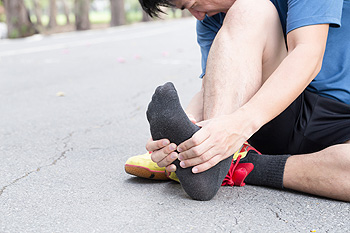Blog
Heel Pain Can Be Treated!
Ways to Alleviate Symptoms of Plantar Fasciitis
 Plantar Fasciitis refers to inflammation on the plantar fascia ligament, this ligament connects the heel to the toes. Overuse and strain can cause this condition, which affects the under arch of the foot and causes pain. This inflammation can also cause tension in surrounding muscles, and this can lead to the pain expanding into the calf. Stretches are beneficial in reducing tension, and therefore help to reduce overall pain. Towel curls can be performed by curling a towel with your toes. This stretch is done by placing a towel on the floor then while sitting, place your feet flat on the towel. By grasping the towel with your toes and curling inward you are stretching out the right parts of your foot. Foot flexes are also effective and are performed by sitting on the floor with your legs straight, then after wrapping an elastic band around your feet, begin to point your toes away from your body. If you believe you have plantar fasciitis, then it is highly recommended you speak to a podiatrist to learn about treatment options.
Plantar Fasciitis refers to inflammation on the plantar fascia ligament, this ligament connects the heel to the toes. Overuse and strain can cause this condition, which affects the under arch of the foot and causes pain. This inflammation can also cause tension in surrounding muscles, and this can lead to the pain expanding into the calf. Stretches are beneficial in reducing tension, and therefore help to reduce overall pain. Towel curls can be performed by curling a towel with your toes. This stretch is done by placing a towel on the floor then while sitting, place your feet flat on the towel. By grasping the towel with your toes and curling inward you are stretching out the right parts of your foot. Foot flexes are also effective and are performed by sitting on the floor with your legs straight, then after wrapping an elastic band around your feet, begin to point your toes away from your body. If you believe you have plantar fasciitis, then it is highly recommended you speak to a podiatrist to learn about treatment options.
Plantar fasciitis can be very painful and inconvenient. If you are experiencing heel pain or symptoms of plantar fasciitis, contact Dr. Luz Colon from Absolute Foot & Ankle Specialists Inc.. Our doctor can provide the care you need to keep you pain-free and on your feet.
What Is Plantar Fasciitis?
Plantar fasciitis is the inflammation of the thick band of tissue that runs along the bottom of your foot, known as the plantar fascia, and causes mild to severe heel pain.
What Causes Plantar Fasciitis?
- Excessive running
- Non-supportive shoes
- Overpronation
- Repeated stretching and tearing of the plantar fascia
How Can It Be Treated?
- Conservative measures – anti-inflammatories, ice packs, stretching exercises, physical therapy, orthotic devices
- Shockwave therapy – sound waves are sent to the affected area to facilitate healing and are usually used for chronic cases of plantar fasciitis
- Surgery – usually only used as a last resort when all else fails. The plantar fascia can be surgically detached from the heel
While very treatable, plantar fasciitis is definitely not something that should be ignored. Especially in severe cases, speaking to your doctor right away is highly recommended to avoid complications and severe heel pain. Your podiatrist can work with you to provide the appropriate treatment options tailored to your condition.
If you have any questions please feel free to contact our office located in Miami, FL. We offer the newest diagnostic and treatment technologies for all your foot and ankle needs.
Read more about Plantar FasciitisPotential Dangers of Wearing High Heels
 Many women choose to wear high heels to enhance the lines of the legs and feet. Research has shown there may be disadvantages to wearing this type of shoe, which may include potential damage to different parts of the foot. If you have a bunion, it may become worse while wearing high heels. This may be a result of limited room in the toe area of the shoe, which may put excess pressure on the toes. Many patients experience ingrown toenails from wearing high heels. This may be due to having inadequate room for the toes to move freely in. Additionally, the risk of falling may increase from wearing high heels, and this may lead to other painful conditions. If you would like additional information about how high heels affect the feet, please consult with a podiatrist.
Many women choose to wear high heels to enhance the lines of the legs and feet. Research has shown there may be disadvantages to wearing this type of shoe, which may include potential damage to different parts of the foot. If you have a bunion, it may become worse while wearing high heels. This may be a result of limited room in the toe area of the shoe, which may put excess pressure on the toes. Many patients experience ingrown toenails from wearing high heels. This may be due to having inadequate room for the toes to move freely in. Additionally, the risk of falling may increase from wearing high heels, and this may lead to other painful conditions. If you would like additional information about how high heels affect the feet, please consult with a podiatrist.
High heels have a history of causing foot and ankle problems. If you have any concerns about your feet or ankles, contact Dr. Luz Colon from Absolute Foot & Ankle Specialists Inc.. Our doctor can provide the care you need to keep you pain-free and on your feet.
Effects of High Heels on the Feet
High heels are popular shoes among women because of their many styles and societal appeal. Despite this, high heels can still cause many health problems if worn too frequently.
Which Parts of My Body Will Be Affected by High Heels?
- Ankle Joints
- Achilles Tendon – May shorten and stiffen with prolonged wear
- Balls of the Feet
- Knees – Heels cause the knees to bend constantly, creating stress on them
- Back – They decrease the spine’s ability to absorb shock, which may lead to back pain. The vertebrae of the lower back may compress.
What Kinds of Foot Problems Can Develop from Wearing High Heels?
- Corns
- Calluses
- Hammertoe
- Bunions
- Morton’s Neuroma
- Plantar Fasciitis
How Can I Still Wear High Heels and Maintain Foot Health?
If you want to wear high heeled shoes, make sure that you are not wearing them every day, as this will help prevent long term physical problems. Try wearing thicker heels as opposed to stilettos to distribute weight more evenly across the feet. Always make sure you are wearing the proper shoes for the right occasion, such as sneakers for exercising. If you walk to work, try carrying your heels with you and changing into them once you arrive at work. Adding inserts to your heels can help cushion your feet and absorb shock. Full foot inserts or metatarsal pads are available.
If you have any questions please feel free to contact our office located in Miami, FL. We offer the newest diagnostic and treatment technologies for all your foot and ankle needs.
Read more about Why High Heels Are Not Ideal for Healthy FeetReminder: When was the last time...?
The Benefits of Having Foot Surgery Performed
 There are several reasons why having foot surgery performed may benefit the overall health of the feet. These may include restoring mobility in the foot or ankle, relieving pain that may be present, or possibly correcting a foot deformity. Removing an ingrown toenail may be an option if the nail is severely infected. If you have a bunion that is causing extreme pain and discomfort, bunion surgery may be an option to think about if other treatments have not been successful. Patients who have sustained an injury to the joints of the ankle may consider having ankle replacement surgery performed. This may be used as a last resort to regain mobility and strength in the ankle and surrounding areas. If you have foot conditions, which may benefit by having surgery performed, it is advised to consult with a podiatrist who can properly assist you.
There are several reasons why having foot surgery performed may benefit the overall health of the feet. These may include restoring mobility in the foot or ankle, relieving pain that may be present, or possibly correcting a foot deformity. Removing an ingrown toenail may be an option if the nail is severely infected. If you have a bunion that is causing extreme pain and discomfort, bunion surgery may be an option to think about if other treatments have not been successful. Patients who have sustained an injury to the joints of the ankle may consider having ankle replacement surgery performed. This may be used as a last resort to regain mobility and strength in the ankle and surrounding areas. If you have foot conditions, which may benefit by having surgery performed, it is advised to consult with a podiatrist who can properly assist you.
Foot surgery is sometimes necessary to treat a foot ailment. To learn more, contact Dr. Luz Colon of Absolute Foot & Ankle Specialists Inc.. Our doctor will assist you with all of your foot and ankle needs.
When Is Surgery Necessary?
Foot and ankle surgery is generally reserved for cases in which less invasive, conservative procedures have failed to alleviate the problem. Some of the cases in which surgery may be necessary include:
- Removing foot deformities like bunions and bone spurs
- Severe arthritis that has caused bone issues
- Cosmetic reconstruction
What Types of Surgery Are There?
The type of surgery you receive will depend on the nature of the problem you have. Some of the possible surgeries include:
- Bunionectomy for painful bunions
- Surgical fusion for realignment of bones
- Neuropathy decompression surgery to treat nerve damage
Benefits of Surgery
Although surgery is usually a last resort, it can provide more complete pain relief compared to non-surgical methods and may allow you to finally resume full activity.
Surgical techniques have also become increasingly sophisticated. Techniques like endoscopic surgery allow for smaller incisions and faster recovery times.
If you have any questions please feel free to contact our office located in Miami, FL. We offer the newest diagnostic and treatment technologies for all your foot and ankle needs.
Read more about Foot SurgeryChildren and Sever’s Disease
 Sever’s disease is a condition that only affects children because their growth plate is still in the process of maturing. A majority of the children affected by Sever’s disease participate in sports and are between the ages of 10 and 15. This condition causes inflammation around the growth plate of the heel bone, which is still growing. The extra stress placed on the foot during sports activities is usually what triggers Sever’s disease. Pain becomes present in the back of the heel, which becomes more sensitive when pressure is applied during actions like running or jumping. Children might develop a minor limp, and they will usually complain of painful sensations in the heel area. If you think your child might have Sever’s disease, it is recommended you bring them to a podiatrist to learn more about the condition and how it can be treated.
Sever’s disease is a condition that only affects children because their growth plate is still in the process of maturing. A majority of the children affected by Sever’s disease participate in sports and are between the ages of 10 and 15. This condition causes inflammation around the growth plate of the heel bone, which is still growing. The extra stress placed on the foot during sports activities is usually what triggers Sever’s disease. Pain becomes present in the back of the heel, which becomes more sensitive when pressure is applied during actions like running or jumping. Children might develop a minor limp, and they will usually complain of painful sensations in the heel area. If you think your child might have Sever’s disease, it is recommended you bring them to a podiatrist to learn more about the condition and how it can be treated.
Sever's disease often occurs in children and teens. If your child is experiencing foot or ankle pain, see Dr. Luz Colon at Absolute Foot & Ankle Specialists Inc.. Our doctor can treat your child’s foot and ankle needs.
Sever’s Disease
Sever’s disease is also known as calcaneal apophysitis, which is a medical condition that causes heel pain I none or both feet. The disease is known to affect children between the ages of 8 and 14.
Sever’s disease occurs when part of the child’s heel known as the growth plate (calcaneal epiphysis) is attached to the Achilles tendon. This area can suffer injury when the muscles and tendons of the growing foot do not keep pace with bone growth. Therefore, the constant pain which one experiences at the back of the heel will make the child unable to put any weight on the heel. The child is then forced to walk on their toes.
Symptoms
Acute pain – Pain associated with Sever’s disease is usually felt in the heel when the child engages in physical activity such as walking, jumping and or running.
Highly active – Children who are very active are among the most susceptible in experiencing Sever’s disease, because of the stress and tension placed on their feet.
If you have any questions, please feel free to contact our office located in Miami, FL. We offer the newest diagnostic and treatment technologies for all your foot and ankle injuries.
Read more about Sever's Disease







